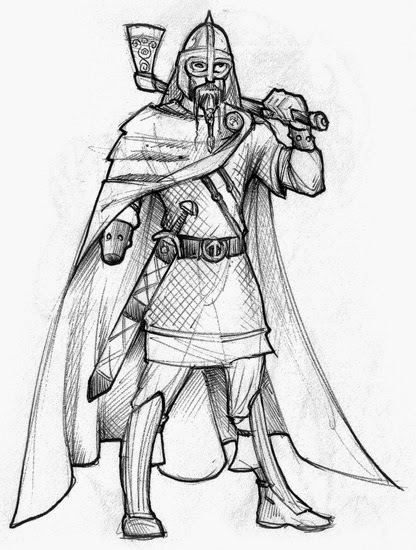Yes, yet another day of the week is named after a Norse god. Tyr (pronounced TEER) is the god of courage and justice. Tyr was originally known as Tiw (rhymes with ewe) and that's why the day is pronounced Tuesday.
That makes four days of the week named after Norse gods.
FYI: The modern Saturday is named after the Roman god, Saturn, but in Norse times it was washing day (apparently some things never change).
Back to Tyr - he is one of the oldest European gods and was originally the chief god, but was later overtaken in popularity and therefore in authority by Odin. The myth was modified so that Tyr later became Odin's son (so even though he is quite old, he belongs to the newer class of gods known as the Aesir).
As you can see from the picture above, Tyr is missing his right hand. That's because it was bitten off by Fenrir the Wolf.
It was predicted that Fenrir (son of the trickster god, Loki) would cause trouble for the gods so they endeavored to bind the giant wolf for their own safety. The wolf refused to allow the suspiciously innocent-looking cord to be put around him unless one of the deities put his or her hand in his mouth as a pledge of good faith.
Labels: Aesir , Norse myth , Thor's Day , Tyr , weekdays
Freyr is one of the most important gods of Norse paganism. He is associated with prosperity, fair weather, and fertility. He is also the ruler of the Alfar (light elves).
- Freyr is the son of Njord and his twin sister is Freya (thus he also belongs to the older class of gods known as the Vanir).
- The sword he carries is a magical sword that can fight on its own.
- The dwarfs gave him a golden-bristled boar. The radiant bristles are considered symbolic either of the solar rays or of golden grain because the boar taught mankind how to plow.
Labels: Freyr , Norse myth , Thor's Day , Vanir
Njord (pronounced NYORD) is the god of the sea and wind.
Njord belongs to the Vanir (an older class of Norse gods associated with wisdom and fertility) and is father to the goddess Freya and her twin brother, Freyr.
Njord is a very handsome god, in the prime of his life, clad in a short green tunic with a crown of shells and seaweed upon his head.
- Njord was the personification of summer because he extended his protection over commerce and fishing, which could only be pursued during the short summer months.
- Njord lived in a palace near the seashore where he stilled the terrible tempests stirred up by Aegir, god of the deep sea.
- Njord is one of the few gods who will survive Ragnarok (the predicted Norse end of the world).
- As all aquatic plants belonged to Njord, the marine sponge was known in the north as "Njord's glove."
Next Thor's Day: Njord's son, Freyr
Labels: Freya , Freyr , Njord , Norse myth , Thor's Day , Vanir











